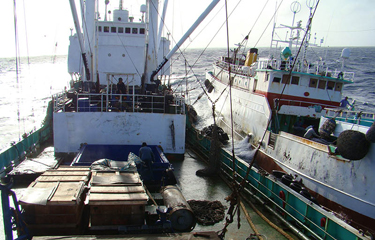Global Fishing Watch has launched a public web portal to track the activity of at-sea transshipment, and has also signed an agreement with the government of Costa Rica to give it access to its vessel-tracking data.
Global Fishing Watch is a partnership between Google and the advocacy groups Oceana and SkyTruth founded in 2015. The new portal, hosted on Global Fishing Watch’s platform, aims to reveal the breadth of transshipment activity worldwide, with the goal of raising awareness among fish suppliers and consumers of the commonality of transshipment and improve transparency. The Pew Charitable Trusts contributed to the development of the portal to guide its effectiveness and application, according to Global Fishing Watch CEO Tony Long.
“We are combining data from various sources and applying machine learning techniques in order to shine a light on what has, historically, been an opaque practice,” Long said. “The public portal makes transshipment data easily accessible and will help bring much-needed transparency to global transshipment activities.”
Transshipment often takes place on the high seas, outside the view and reach of authorities, making it harder for them to verify that the amount and type of fish product transferred is lawful and sustainable, according to Global Fishing Watch
“Current monitoring and regulatory controls over transshipments at sea are inadequate, as there are few guarantees that all transfers are being reported and observed. This interactive, first-of-its-kind portal uses satellite technology, machine learning, and up-to-date vessel authorization databases to give users consolidated information on carrier vessels’ activities, allowing them to analyze vessel tracks and see which ports the vessels frequent,” it said. “By using the portal, fishery managers can improve how they monitor and regulate this vital part of the seafood supply chain, helping to ensure the long-term sustainability of the fisheries they oversee.”
The portal will allow regional fishery management organizations and other regulatory and governmental bodies the ability to cross-check vessel monitoring system data and with national and observer reports and other publicly available information, according to Amanda Nickson, director of The Pew Charitable Trusts’ international fisheries work.
“This portal will enable managers to verify transshipment activities, helping to reduce opportunities for unauthorized transfers of fish product and identify when such activity is not being adequately reported,” Nickson said. “It’s time to change the way transshipment is managed. We hope this portal will give policymakers the additional information they need to reform this practice.”
Also announced this week was an agreement between Global Fishing Watch and Costa Rica, under which the latter will share vessel tracking data with the former. As part of the agreement, Costa Rica also committed to enhancing monitoring and control of its waters, which cover close to 600,000 square kilometers.
The agreement was signed 29 July between the Costa Rican Institute for Fisheries and Aquaculture (INCOPESCA) and Global Fishing Watch, with the support of PACÍFICO and the Forever Costa Rica Association. PACÍFICO is a foundation made up of four environmental funds based in Costa Rica, Colombia, and Panama, with the mission of serving as a regional funding platform to ensure the sustainable management of the Eastern Tropical Pacific Ocean.
“Working together with Global Fishing Watch will allow us to promote the sustainable use of our marine resources by strengthening control and surveillance measures in our jurisdictional waters – aspects that the fishing sector considers necessary to guarantee that the fish being sent to international markets comes from sustainable sources,” INCOPESCA Executive President Daniel Carrasco Sánchez said. “As a country, we are convinced of the importance of joining efforts against illegal, unreported, and unregulated fishing in our maritime territories, both the Pacific and the Caribbean. Efforts taken by the State to manage fisheries, use marine resources, or protect its biodiversity will not be successful without a collective effort to prevent, deter, and eliminate this threat, which also risks exacerbating poverty and declines in seafood catch.”
Information to be provided to Global Fishing Watch will be limited to vessels' flags and activity tracks, with a 72-hour delay before data is published to the map. Fishing activity will be analyzed to enhance authorities' understanding of a given vessel’s behavior, which enables compliant fishers to be easily identified and noncompliant vessels more readily recognized, according to Carrasco Sánchez.
“Costa Rica’s progressive decision to adopt fisheries transparency will support a sustainable future, serving to strengthen governance of the country’s rich marine resources for the well-being of people and nature. As more countries embrace transparency in fishing operations, illegal fishers will have fewer places to plunder,” Long said.
“Transparency is crucial for responsible stewardship of our global ocean – to fight illegal fishing, to protect fish stocks and livelihoods, and to increase the safety and welfare of fishers,” added Long. “Costa Rica’s decision to publish its vessel data via our map adds real momentum to the drive for more public information on fishing activity.”
Costa Rica becomes the fifth country to share its proprietary vessel-monitoring system data with Global Fishing Watch, after Indonesia, Peru, Chile, and Panama.
Photo courtesy of Juan Vilata/Global Fishing Watch







